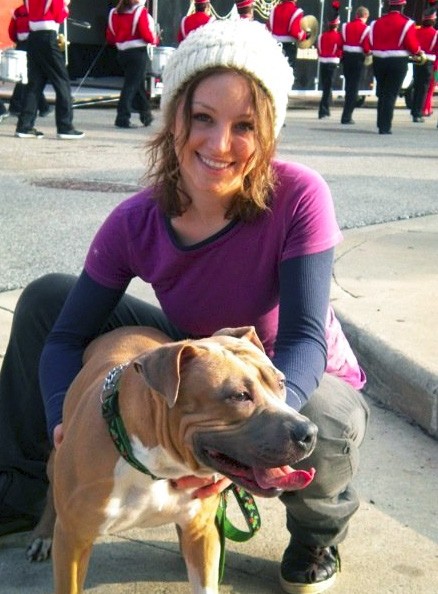GV student wins national award for animal advocacy

Courtesy Photo / Lena Spadacene Senior Lena Spadacene recieved a student leadership award from the Humane Society for her involvement in bringing cage-free eggs to GVSU
Feb 10, 2011
Although she received the Humane Society of the United States’ (HSUS) student leadership award, Grand Valley State University senior Lena Spadacene said she is the more excited about the campaign that got her there than the award itself.
“To receive national recognition is an honor, but I am more excited about the concept of a cage-free campaign receiving institution-level acknowledgement,” she said. “It’s one thing to buy cage-free eggs at the store once in awhile, but it’s another thing for 1.4 million eggs a year to be purchased from hens that aren’t subject to cages so small they hardly have the room to turn around.”
Spadacene, co-founder of GVSU’s own HSUS chapter, said getting involved in bringing cage-free eggs to GVSU was something that was decided upon because of the immediate impact it would have.
“A cage-free campaign was the ultimate decision for HSGV’s first campaign because we knew that if it were to come into fruition it would benefit the most animals in the least amount of time,” she said. “The life of a hen is grim – with her beak burned off, skin rubbed raw, and wings, neck, and legs continuously getting caught in the wiring, we felt this would be a minor, yet substantial improvement for birds in our area.”
Josh Balk, who is a spokesperson for the HSUS, said because of what Spadacene was able to accomplish, GVSU was able to become a more humane university.
“Eggs from caged hens come from hens confined so tightly, they can’t even spread their wings,” he said. “In fact, each hen is given less space than a single sheet of paper to lift for her entire life. By switching to cage-free eggs, the campus, because of Lena’s phenomenal leadership, took a move in the more humane direction.”
According to the HSUS website, “unlike battery hens, cage-free hens are able to walk, spread their wings and lay their eggs in nests, vital natural behaviors denied to hens confined in cages.”
To help bring cage-free eggs to GVSU, Spadacene worked with Campus Dining and its sustainability initiative, called the Green Team, to collect petitions from students and faculty. She said she received hundreds of signatures from people to help her cause.
“We collected hundreds of signatures from students, professors, staff, and Campus Dining employees within 48 hours of making the campaign public in March,” she said. “We would have continued to share the support of the campus through signatures if Campus Dining hadn’t responded so quickly by granting us a final meeting to discuss the issue.”
Spadacene also said that Campus Dining helped in investigating cage-free facilities in the area.
“The most rewarding part about working with the Green Team was that they concurred with our vision of improving animal welfare and Grand Valley’s environmental stewardship – not only did they help investigate cage-free facilities but they focused on places within 150 food miles,” she said. “Their dedication and environmental consciousness is beyond any other dining facility that I know.
Cage-free eggs have become such a big issue that in 2009, the state of Michigan became the second state to outlaw the cage confinement of hens. Because of Spadecene’s efforts, according to a press release, GVSU is the first university in Michigan to serve cage-free eggs exclusively.






















